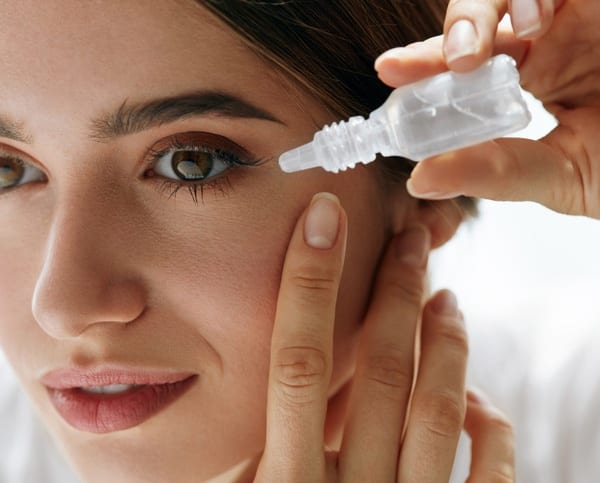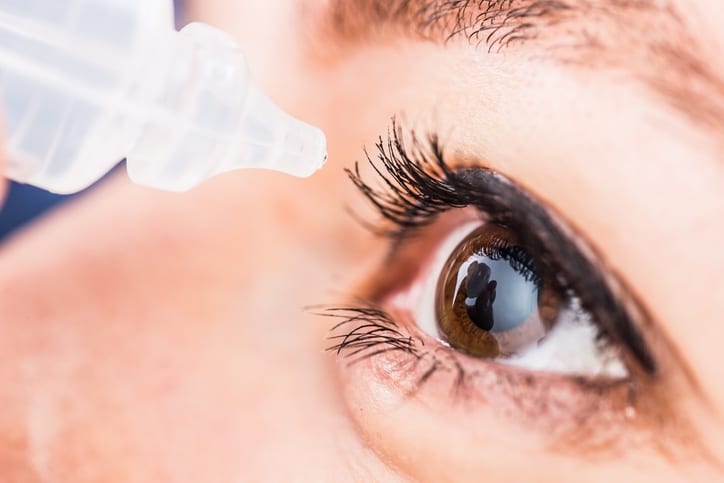Dry Eye Treatment in Everett, WA
What is Dry Eye?
Dry eye is a condition in which the eyes are not sufficiently lubricated, leading to redness, itchiness and pain. Dry eyes can occur when the tear ducts are not producing enough tears, or if there is a chemical imbalance in the tears themselves. Natural tears have a particular chemical balance that lubricates the eyes efficiently.

What Causes Dry Eyes?
People usually begin experiencing dry eyes as they age (symptoms are more common in people older than 50), but they can also result from certain medications, medical conditions or injuries. Dry eyes tends to affect women more than men because of the hormonal changes that take place during pregnancy and menopause. Oral contraceptives can also affect the consistency of tears. Other causes of dry eyes include the following:
- Antihistamines, decongestants and blood-pressure medications
- Rheumatoid arthritis, diabetes, Sjögren’s syndrome and thyroid disease
- Environmental conditions such as smoke, wind or excessive sun
- Long-term contact lens use
- Eye injury
- Eye or eyelid surgery
- Inflammation of the eye (conjunctivitis or keratitis)
Any of these factors, alone or in combination, can affect the frequency or consistency of tears, either of which can lead to dry eye.
What are the Symptoms of Dry Eyes?
Dry eye symptoms typically occur in both eyes, and include the following:
- Stinging, burning or scratchiness
- Eye fatigue
- Sensitivity to light
- Difficulty wearing contact lenses
- Excessive tearing
- Blurry vision
Dry eye can damage eye tissues, leaving tiny abrasions on the surface that can impair vision. There are, however, many treatments for relieving dry eye symptoms, restoring eye health and protecting vision.
What Dry Eye Treatment Options are Available?
Dry eye treatment depends on its cause and severity, as well as the patient’s overall health and personal preference. There are several dry eye treatment options that we can recommend for you during your exam, which include non-surgical and surgical options.
Nonsurgical Treatments
Nonsurgical dry eye treatment options, which include the following, are often effective:
- Deliberately blinking
- Increasing humidity levels at home or work
- Using artificial tears or a lubricating ointment
- Avoiding environmental irritants
- Eliminating medications that may be responsible
- Adding Omega-3 fatty acids to the diet or taking them as supplements
In many cases, simple lifestyle changes can alleviate dry eye symptoms.
Surgical Treatments
If less invasive methods are unsuccessful, surgical treatments, which include the following, may be an option:
- Insertion of punctal plugs to limit tear drainage
- Punctal cautery to permanently close the drainage holes
- Treatment of an underlying disease
If an eyelid condition is causing dry eyes, eyelid surgery may be recommended.
If dry eye is left untreated, it can lead to complications that include pain, corneal ulcers/scars or vision loss.
What People Say About Us!
Patient Testimonial
“I have been a patient of Dr. Lueth’s for many years, and I am very pleased with his care. I recently underwent cataract surgery and appreciated the efficient and considerate care provided me. I would certainly recommend this group to anyone looking for excellent eye care.”
Click here to read more reviews.
How to Prevent Dry Eyes:

Dry Eyes FAQs
How Long Will Dry Eye Symptoms Last?
Everyone has dry eye from time to time. It could be due to an allergy medication you’ve taken in the spring. It could be due to a windy day out on a Mukilteo ferry. You could have stared at your computer screen for too long today. For most people who suffer from occasional or mild dry eye, using over-the-counter artificial tears is all the treatment necessary. These symptoms will pass within a few days at most.Chronic dry eye is another story. Those patients whose dry eye doesn’t respond to artificial tears need to see one of our ophthalmologists at Physicians Eye Clinic. This chronic dry eye could be the result of problems with your eyelids, your tear quality, or that your tears are exiting your eyes too quickly.
Can Allergies Cause Dry Eyes?
Allergies can cause dry eyes, but this is due to irritation rather than inadequate tear production or poor tear consistency. Allergens do irritate the eyes, leading to many of the same symptoms found with dry eye: stinging or burning eyes, excessive tearing, and scratchiness on the eyes.The irony here is that if you take antihistamines to treat your allergies, these can actually make your dry eyes worse.
Contact us Today!
How Can I Prevent Dry Eyes Occurring From Allergies?
Prevention strategies, of course, depend on what you are allergic to. But if you’re a typical allergy sufferer, these steps could definitely help prevent dry eye related to allergies:
- Close the windows in your house and car when pollen counts are high.
- Use air conditioning (if you have it in Everett) when pollen is flying around.
- Wearing sunglasses will help keep pollen from entering your eyes when outside.
- In damp Everett, molds can be a problem. A dehumidifier can cut down on mold.
- Wash your hands after you pet a dog or cat to keep the dander away from your eyes and nose.
What’s the Difference Between Dry Eyes and Having Chronic Dry Eye?
Having occasional dry eye from allergies, working too long on a computer, a dusty day, or other causes is different from chronic dry eye.Chronic dry eye is due to two main reasons. Either your eyes don’t make enough tears, or the tears your eyes do make are not the right consistency and they evaporate too quickly from the eye surface. One or both of these causes can be behind a person’s chronic dry eye.
Why Does Tear Quality Matter?
Every time your eye blinks, a film of tears washes down the front of the eyeball, keeping it smooth and clear. When healthy, these tears consist of three layers: an oily layer, a watery layer, and a mucus layer. The oily layer, produced by the Meibomian glands, is the outside layer. Its purpose it to reduce tear evaporation and smooth the tear surface. In the middle is the watery layer we usually associate with tears. The lacrimal gland produces this layer that cleanses and washes out any foreign particles or irritants. The inner layer consists of mucus produced by the conjunctiva. Mucus allows the tears to adhere to the eyeball.Tears need to have all three layers to perform their function on the eyes.
What Causes Chronic Dry Eye?
Dry eye can result from various problems. As we age, everyone’s tear production drops. This is especially true of women after menopause. Often, tear quality is diminished when the Meibomian gland is blocked because tears evaporate too quickly from the eye without the protection of the outer oil layer. A variety of medications can also reduce tear production: antihistamines, diuretics, beta-blockers, sleeping pills, nerve medications, and pain relievers.Dry eye really comes down to one of these (or a combination of) three problems:
- Lack of saline water
- Dysfunctional Meibomian oil glands
- Inflammation of the glands that make the saline water and oil
How is Dry Eye Diagnosed?
The dry eye that is due to fleeting conditions such as high pollen counts or working on a computer doesn’t require attention, as it will usually resolve with some changes in what the person is doing or some over-the-counter eyedrops.But chronic dry eye needs attention. This is how our three Physicians Eye Clinic ophthalmologists diagnose dry eye:
- A thorough eye exam — This will detail your overall health issues and your eye health to help pinpoint possible causes.
- Tear volume — We can measure your tear volume with the Schirmer test. In this test, we place blotting strips of paper under your lower eyelids. After five minutes we measure the amount of the strip that has been soaked by your tears.
- Tear quality — We use special dyes in eyedrops to watch the surface of your eyes, looking for staining patterns on the cornea. We also measure how long it takes your tears to evaporate.
Could I Need Surgery to Cure My Dry Eye?
Chronic dry eye can be treated effectively with a variety of treatments. Sometimes it involves trial and error to find the most effective option. Switching medications can eliminate the side effect of dry eye. Eyelid surgery can correct issues with eyelids turning inward or outward and causing dry eye. Various medications, such as immune-suppressing Restasis can be effective. Tear stimulating drops and eye inserts can increase tear production.
Unblocking the Oil Glands
Applying a warm compress to the eyelids can be successful in opening blocked Meibomian glands. There are also two tools available to open these glands: LipiFlow and EyeXpress. Both of these systems heat the dysfunctional Meibomian oil glands to open them up and allow the natural flow of lipids into the tears. This improves their consistency and stops the tears from evaporating too quickly.
In patients where the tears are simply exiting the eyes too quickly, a simple surgical option can be effective:
Punctal Plugs
In patients where the tears are simply exiting the eyes too quickly, a simple surgical option can be effective. If we find that your tears are exiting your eyes too quickly, we may opt to partially or completely close your tear ducts. To do this, we surgically insert tiny silicone plugs, known as punctual plugs, into the ducts. These are removable, if your condition changes.

